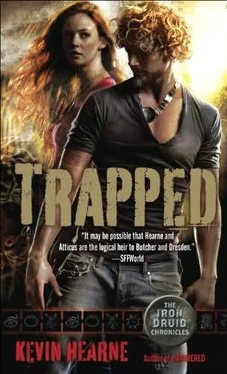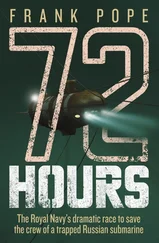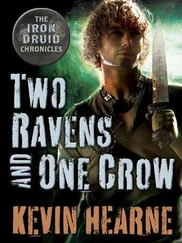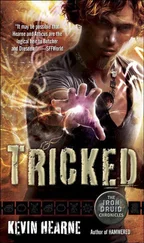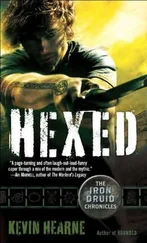That didn’t mean everything between us was now Kool and the Gang. Frigg was simply better than any other surviving member of the Norse pantheon at concealing her urge to kill me.
“I expect you’ve heard something about Loki?” I said.
“We have heard and seen much,” she said. “May we speak for a time?”
“Sure.”
“Good. Events are moving toward the cusp of disaster, and we need to make our move soon if we want to avoid the worst.”
I steeled myself for unpleasant news. Regardless of what Loki had been up to, I was at least partially responsible for setting events in motion. Frigg reminded me of this immediately.
* * *
Shortly after your raid on Asgard twelve years ago, Hel realized she could freely travel the nine planes of Yggdrasil, for that had been forbidden her until then. When Odin had cast her into Niflheim long ago and given her control of the nine realms, her authority extended to only the old and infirm and those unfortunate enough not to be called to Valhalla or Fólkvangr. She could never leave her frozen land on her own, not without the Norns telling Odin and him casting her down again.
Once freed, she spent much more time on Midgard than we’d originally thought. Odin missed much while he was recuperating, and Hel took advantage of this. She returned to Niflheim with several conclusions, no doubt, one of them being that she needed to learn English, the new dominant language, just as many of the Æsir did some centuries before. We can infer she thought it best that Loki learn it as well, for she sent a shade, one gifted with speech, to teach him the language. We had guards posted at the entrance to Loki’s cave, of course, but they could do nothing to stop the shade. Seeing that it could not possibly set Loki free, and seeing also that it was providing him a welcome distraction from his captivity, we let the shade remain. However, we increased the guard at the cave—fifty Einherjar, outfitted and trained in the use of modern weapons—and also installed some … observers inside. These were sort of like Odin’s ravens.
We began to receive reports that Hel was building forges in her realm and trading for raw materials from the Svartálfar. The dwarfs, bless them, refused to do so. Hel had learned from her time in Midgard that swords and shields would not be enough to carry the day. About nine years ago she started to manufacture weapons in earnest and to train her draugar in their use. She now has a massive army of soldiers with automatic weapons, who cannot be killed unless their heads are destroyed or struck off from their bodies.
Odin has been preparing the Einherjar to meet them, but even with modern body armor, they are at a disadvantage. The dwarfs have chosen to cast their lots with ours and have likewise been making preparation for the final battle. They have new transports and weapons unlike any I have seen.
According to our estimates, Hel could have begun Ragnarok during the past year with a fair chance of success, especially once Surtr and the sons of Muspell got involved. With no Thor to meet Jörmungandr, and no one to stop Fenris, her victory seemed assured—at least on paper.
What has prevented her seems to be a psychological inability to proceed without her father, Loki. She could have the world for her own right now, she could lay waste to Midgard and shape it howsoever she wills, but instead she craves his favor.
Some days ago, she made her move. She brought two thousand armed draugar to the cave against our fifty Einherjar. She stepped over their honorable corpses and entered the cave, wearing the form of a bent old woman.
Sigyn, Loki’s wife, recognized her and demanded that she leave.
“You have no cause to be here!” she cried. “Is not Niflheim enough for you?”
Hel ignored her and spoke in her sepulchral voice to Loki, as the snake dripped its venom into the bowl Sigyn held above his face.
“Father,” she rasped, “we can leave this place today and win Ragnarok. The old prophecies are null. The Norns are dead. Heimdall, who was fated to slay you, is dead. Freyr is dead. Týr and Vidar are dead. Even mighty Thor is dead, and my army is ready.”
The god of mischief did not stir until he heard the name of the thunder god. “What?” Loki said. “You say Thor is dead? How?”
She told him of your party’s invasion of Asgard and how you surprised us with defeat. She named your party: the werewolf, the vampire, the alchemist, the Druid, the wizard, and the thunder god.
“What thunder god?” Loki wanted to know.
“Perun. The Slavic god. He has disappeared.”
“But he is not dead?”
“I do not know, Father,” she said. “He may be dead.”
“I know how to find out,” Loki said, grinning in such a way as he had not for centuries. “Set me free, daughter.”
“Father, I cannot unbind you. Only you can do this. But I can make you do it sooner rather than later.”
“How?”
“Answer me first: Do you still love this cow?” Hel jutted her chin toward Sigyn, who had protected Loki as best she could from the snake’s dire venom all these years. But she was not Hel’s mother. Loki’s monstrous children were all borne by a giantess.
“Her?” Loki sneered. “No, I hate her. She has neither killed the snake nor erected a roof over my head, despite my pleading that she do so. She is thoughtless, worthless.”
“And so I set you free,” Hel said. She sloughed off her human visage and appeared in her true form, sprouting like an unwholesome weed to the roof of the cave. She pulled the wicked knife, Famine, from its scabbard in her exposed rib cage and plunged it into the neck of the faithful Sigyn.
Loki’s wife gurgled her last breath, and the bowl of caustic venom toppled full into Loki’s face. He screamed and writhed violently, and still the snake dripped on, under the goddess Skadi’s command to continue. Loki jerked and pulled at his restraints, and the earth shook underneath Hel’s feet. He cursed her. He swore vengeance upon her. And then, as the venom continued to eat at his eyes and chew at the substance of his flesh, he begged her for mercy.
But Hel had none. Mercy was an empty room in her heart, where nothing at all was sacred and no living creature, not even her father, could cry so piteously as to make her take heed.
Loki bucked and howled as the venom bore deeper. He thrashed and shouted his defiance. The earth trembled more violently, and this grew and grew until his bonds were finally snapped and he was set free. Blood and tears streamed down his purpling cheeks, and he seized the snake that had tormented him so and burned it alive in his hands, his fire returned to him now that he was unbound. No freedom had ever been bought with so much agony, and he vowed it would be avenged sevenfold, beginning with the Slavic thunder god.
We do not know why he focused on Perun rather than on the vampire who killed Thor; perhaps it was because he was a target of convenience. Loki knew that the entrance to the Slavic plane lay hidden somewhere in the Ural Mountains, and it was to these he flew upon first leaving his cave.
He left Hel behind, without thanks, bereft of approval, and with no signal that she should begin Ragnarok. Unable to follow him, she returned to her realm, sullen and uncertain, to await further word from her father.
* * *
“And that is why we must strike now and slay Fenris,” Frigg finished, clearly angling for the non sequitur of the year.
Читать дальше
